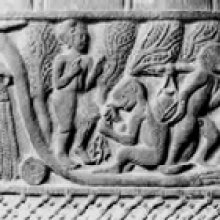Dusa, Ḍusa, Dūsa, Dūṣa, Ḍūsa, Dusha: 13 definitions
Introduction:
Dusa means something in Hinduism, Sanskrit, Buddhism, Pali, Marathi, Jainism, Prakrit. If you want to know the exact meaning, history, etymology or English translation of this term then check out the descriptions on this page. Add your comment or reference to a book if you want to contribute to this summary article.
The Sanskrit term Dūṣa can be transliterated into English as Dusa or Dusha, using the IAST transliteration scheme (?).
Images (photo gallery)
In Hinduism
Vyakarana (Sanskrit grammar)
Source: Wikisource: A dictionary of Sanskrit grammarDūsa (दूस).—tad. affix prescribed after the word अवि (avi) in the sense of milk(दुग्ध (dugdha)) along with the affixes सोढ (soḍha) and मरीस (marīsa) optionally, by the Vartikakara; e. g. अविदूसम् । अविसोढम् । अविमरीसम् (avidūsam | avisoḍham | avimarīsam); cf. Kas, on M. Bh. IV. 2. 36.

Vyakarana (व्याकरण, vyākaraṇa) refers to Sanskrit grammar and represents one of the six additional sciences (vedanga) to be studied along with the Vedas. Vyakarana concerns itself with the rules of Sanskrit grammar and linguistic analysis in order to establish the correct context of words and sentences.
Languages of India and abroad
Marathi-English dictionary
Source: DDSA: The Molesworth Marathi and English Dictionaryḍusa (डुस).—ind Better ḍhussa.
Marathi is an Indo-European language having over 70 million native speakers people in (predominantly) Maharashtra India. Marathi, like many other Indo-Aryan languages, evolved from early forms of Prakrit, which itself is a subset of Sanskrit, one of the most ancient languages of the world.
Sanskrit dictionary
Source: DDSA: The practical Sanskrit-English dictionaryDūṣa (दूष).—a. (At the end of comp.) Defiling, polluting; e. g. पङ्क्तिदूष (paṅktidūṣa).
Source: Cologne Digital Sanskrit Dictionaries: Benfey Sanskrit-English DictionaryDūṣa (दूष).—[-dūṣa], i. e. duṣ, [Causal.], + a, latter part of comp. adj., Defiling; in pañkti- (a company), Mahābhārata 13, 1274.
Source: Cologne Digital Sanskrit Dictionaries: Cappeller Sanskrit-English DictionaryDūṣa (दूष).—[adjective] defiling, polluting (—°).
Source: Cologne Digital Sanskrit Dictionaries: Monier-Williams Sanskrit-English Dictionary1) Dūṣa (दूष):—[from duṣ] a mfn. defiling, corrupting (ifc.; cf. kora-, paṅkti).
2) b ṣaka, ṣaṇa, ṣita See under √2. duṣ.
3) Dūsa (दूस):—See avi-d.
Source: Cologne Digital Sanskrit Dictionaries: Yates Sanskrit-English DictionaryDūṣa (दूष):—(ya) dūṣyati 4. a. To be or become bad, to make bad.
Source: DDSA: Paia-sadda-mahannavo; a comprehensive Prakrit Hindi dictionary (S)Dūṣa (दूष) in the Sanskrit language is related to the Prakrit word: Dūsa.
[Sanskrit to German]
Sanskrit, also spelled संस्कृतम् (saṃskṛtam), is an ancient language of India commonly seen as the grandmother of the Indo-European language family (even English!). Closely allied with Prakrit and Pali, Sanskrit is more exhaustive in both grammar and terms and has the most extensive collection of literature in the world, greatly surpassing its sister-languages Greek and Latin.
Prakrit-English dictionary
Source: DDSA: Paia-sadda-mahannavo; a comprehensive Prakrit Hindi dictionary1) Dūsa (दूस) in the Prakrit language is related to the Sanskrit word: Dūṣ.
2) Dūsa (दूस) also relates to the Sanskrit word: Dūṣa.
3) Dūsa (दूस) also relates to the Sanskrit word: Dūṣya.
Prakrit is an ancient language closely associated with both Pali and Sanskrit. Jain literature is often composed in this language or sub-dialects, such as the Agamas and their commentaries which are written in Ardhamagadhi and Maharashtri Prakrit. The earliest extant texts can be dated to as early as the 4th century BCE although core portions might be older.
Kannada-English dictionary
Source: Alar: Kannada-English corpusDūsa (ದೂಸ):—[noun] a variety of paddy; (details ? = kaṇḍa batta?).
--- OR ---
Dūsa (ದೂಸ):—[noun] = ದೂಷ್ಯ [dushya]2 - 4 & 6.
Kannada is a Dravidian language (as opposed to the Indo-European language family) mainly spoken in the southwestern region of India.
Nepali dictionary
Source: unoes: Nepali-English Dictionary1) Ḍusa (डुस):—n. douching;
2) Ḍūsa (डूस):—n. → डुस [ḍusa]
Nepali is the primary language of the Nepalese people counting almost 20 million native speakers. The country of Nepal is situated in the Himalaya mountain range to the north of India.
See also (Relevant definitions)
Starts with (+23): Dusa-, Dusaa, Dusada, Dusada-Da-Di, Dusadha, Dusadi, Dusaga, Dusaha, Dusahania, Dusahia, Dusaka, Dusama, Dusamanagiri, Dusamkada, Dusamtha, Dusanjam, Dusannappa, Dusar, Dusara, Dusara-tyavara-petavum-pahato-vidi.
Query error!
Full-text (+5): Koradusha, Avidusa, Panktidusha, Dush, Duus, Avitucam, Dushah, Kritadusha, Dusaha, Dusa-, Vastikarma, Vastikarm, Dusu, Dushya, Panktipavana, Dushika, Dusaka, Kaccatushan, Tucakkutinai, Shodha.
Relevant text
Search found 14 books and stories containing Dusa, Ḍusa, Dūsa, Dūṣa, Ḍūsa, Dusa-a, Dusha; (plurals include: Dusas, Ḍusas, Dūsas, Dūṣas, Ḍūsas, as, Dushas). You can also click to the full overview containing English textual excerpts. Below are direct links for the most relevant articles:
Indian influences in the Philippines (by Juan R. Francisco)
Sanskrit terms for Government in Filipino language < [Chapter 1 - Sanskrit in the Philippine languages]
Sanskrit terms for God and Religion in Filipino language < [Chapter 1 - Sanskrit in the Philippine languages]
Chapter 3 - Semantic Development of Sanskrit in the Philippine languages
Jataka tales [English], Volume 1-6 (by Robert Chalmers)
Jataka 268: Ārāma-Dūsa-jātaka < [Book III - Tika-Nipāta]
Notices of Sanskrit Manuscripts (by Rajendralala Mitra)
Page 247 < [Volume 9 (1888)]
World Journal of Pharmaceutical Research
Treatment of dushta vrana with apamarga kshara pichu < [2021: Volume 10, August issue 10]
Conceptual study of cumulatives poisons with special reference to dushi visha. < [2017: Volume 6, June issue 6]
Dushivisha induced khalitya ayurvedic management – a case study < [2021: Volume 10, April issue 4]
Vasudevahindi (cultural history) (by A. P. Jamkhedkar)
37. Household appliances (in ancient India) < [Chapter 3 - Social Conditions]
34. Ornaments, Dress and Decorations (in ancient India) < [Chapter 3 - Social Conditions]
International Ayurvedic Medical Journal
A review article on dushivishajanya indralupta disease < [2022, Issue 12 December]
Critical review of cosmetic toxicity w.s.r. dushi visha < [2015, Issue XII December]
